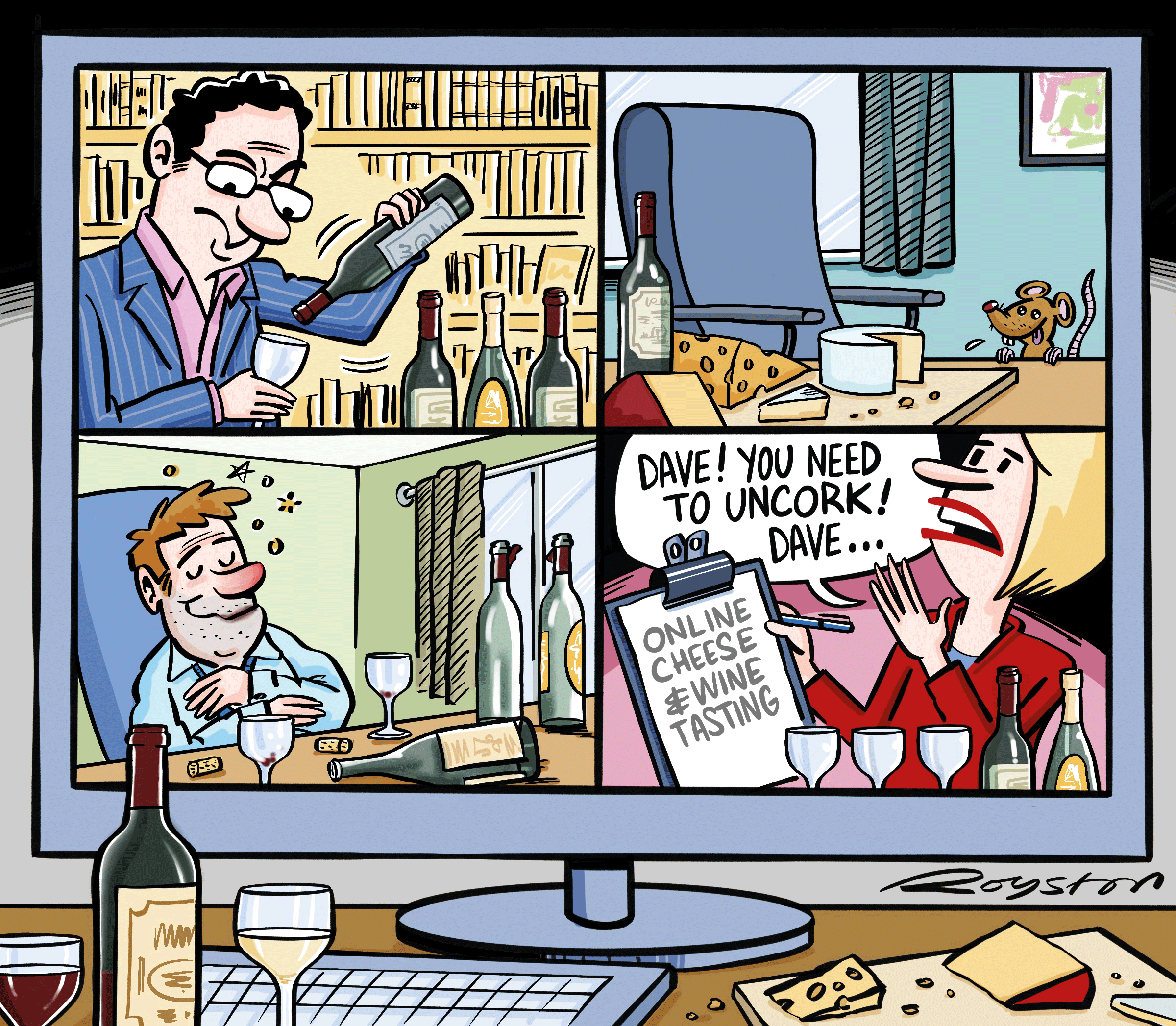There is an event that catches my eye as interesting – a talk with questions, organised for people like me by someone who ultimately hopes to get some money out of our relationship. So here I am, as so often before, sitting promptly and comfortably with an early evening glass of wine waiting for a topical lecture to start. Only the socks drying on the radiator detract from the feeling that I am having a nicely high-level experience. This event - for university alumni, as it happens – is, of course, online.
Even though the organisers could open the event to anyone at little cost, it is invitation-only, and apart from the hosiery aspect I am feeling quite special – right up to the point where my eldest daughter, who has joined me, leans over and types a message to the speaker in the event chat box: ‘I like yr shelves!’ (a comment that, of course, all attendees can see and which is attributed to me).

This is the online world of engagement and relationship building to which commercial law firms have also had to adapt. There have been no events in swanky art galleries, no topical talks in plush lecture spaces, no agreeable lunches or days at the races. Black-tie awards, book launches, press parties, private tours, mingling… all a receding memory. At least for now.
So, what to do? The Gazette has found a wide range of events and activities which have been created to fill the void. Some are directly transposed physical events, but a lot are new experiences. Some are improvised ideas, continued after good feedback; others are ‘fun’ high-end commercial packages that involve the delivery to participants’ homes of products needed to take part.
The time between the first national lockdown in March 2020 and planned events moving online was rapid. Leor Franks, business development and marketing director at Kingsley Napley, recalls ‘a rush to Zoom’, with the legal world becoming ‘webinar-tastic’. There was a convergence around a few digital platforms, which law firms immediately adopted to continue interacting with clients. ‘It had been possible to do it this way for several years,’ Franks notes, but adds: ‘It was cultural anathema though, seen as impersonal and impolite.’
We have a role in ensuring we all feel connected and supported. Collaboration and co-operation are at the core of our strategy and are even more important at this time, both for our people and our clients
Penny Angell, Hogan Lovells
Webinar topics have remained serious and closely related to the clients’ legal needs. ‘Always focus on what’s happening and what explains the client’s world,’ Franks advises. But with the necessary technology easily available, firms of all sizes are able to organise such events. Kingsley Napley’s strategy has been to invite speakers and panellists from outside the firm to talk alongside its own lawyers – participants who have a ‘halo effect’. For a panel discussion on law firm culture (the firm advises many professional practices), the lineup included an academic and a regulator, and was chaired by Gazette columnist Joshua Rozenberg.
Construction law specialist Barton Legal also focuses on outside speakers. And the move to online events has allowed the firm to more easily feature people from across the world. High-profile speakers in its programme have included the sector’s most senior figures, notably Bill Howard, president of the International Federation of Consulting Engineers; and Claudia Salomon, incoming president of the ICC International Court of Arbitration. The firm has also produced handout notes for attendees, as it would for a physical event.

What to do: saying it with flowers?
- Webinars: presentations on business-critical topics went online almost instantly with lockdown. What makes a webinar stand out? Some outside expertise or a figure well known in their field joining the panel is helpful.
- Scratch ‘n’ sniff? Well, taste and smell anyway – experts leading attendees through a chocolate, cheese or wine tasting has proved popular. Flower arranging classes have also featured.
- What’s missing? Over the festive season, the usual carol concerts were gone. Could you help host such things online?
- Entertainment: illusionists and magicians for staff and clients make a good performance.
- Creative arts: these have suffered during the pandemic, with live performances cancelled. Attendees like knowing an event is supporting actors and artists.
- Pilates and yoga: these are not for everyone, but as with other interactive events, they fix themselves in the memory, by dint of the effort made by participants. Also, not everyone relishes drinking wine at a Zoom event.
- A book club: people are reading more, and a book club is a regular event to which they will commit.
Is there anybody out there?
Anyone who has experience of organising events will know the host’s biggest worry – will guests turn up? Law firms and barristers’ chambers may have adapted to events being online, but have clients?
Figures shared with the Gazette show that attendance figures can hold up, or even exceed, previous expectations. ‘Since the start of the year, we have reached more members through our events than ever before,’ says Claire Marsh, head of events and training at the Law Society. ‘Our largest webinar, which was on the updated anti-money laundering guidance, saw 1,684 delegate registrations for the live webinar and over 600 have viewed the post-webinar video.’
Barton Legal reports more than 1,750 registrations for events, with an average of 80 people attending each webinar from across 70 countries. One seminar drew participants from 62 different countries – it is not just speakers who come from further afield than they would for a short physical event.
A greater challenge is helping attendees to interact – the networking that many value at a physical event. Some organisers have taken steps to make this possible at online events. Marsh says: ‘In January we acquired a brilliant online event platform which allows one-to-one networking, concurrent sessions and virtual expo booths alongside chat and polling functionality.’
Barton Legal’s director Bill Barton also wants to encourage attendees to interact: ‘While [it’s] a webinar, we hold each event as if it were a real meeting. We want people to be able to see others and to chat and network, both before and after the actual webinar. This engagement across professions, countries and access to direct industry leaders is why our webinars have been cited as “creating community” for construction professionals on an international scale.’
While [it’s] a webinar, we hold each event as if it were a real meeting. We want people to be able to see others and to chat and network, both before and after the actual webinar
Bill Barton, Barton Legal
A bit of fun
The trust and connections that the business world runs on are not just built on a serious diet of topical discussions and talks, though time-pressed clients will prioritise subjects that are central to their day jobs. Entertainment – a bit of fun – has always been important.
This is where more physically interactive ideas come in. In addition to its webinar programme, global firm Hogan Lovells has run a range of more sociable events reflecting, as UK managing partner Penny Angell puts it, ways ‘the pandemic has totally changed how we live and work’.
Some events are aimed at both staff and clients. Over the festive period these included a few shows with a well-known illusionist, a virtual carol concert and a children’s Christmas party.
Then there are client events that require a few physical extras. For some Hogan Lovells clients that has included chocolate, cheese and wine tastings, where participants are led by an expert presenting live online. ‘Bubbles and blooms’ also worked well (client flower arranging and drinks over Zoom). Another option was a pilates class.
‘As a firm, we have a role in ensuring we all feel connected and supported,’ Angell explains. ‘Collaboration and co-operation are at the core of our strategy and are even more important at this time, both for our people and our clients.’
Many have missed being able to visit art galleries and museums, leading some firms to develop partnerships to give clients and contacts access to online exhibitions. Like all other online events, a gallery tour led by an expert also has the advantage of being internationally accessible.
International firm Skadden, Arps, Meaghan & Flom worked with New York’s New Museum to offer guests a tour of the gallery’s critically acclaimed exhibition ‘Grief and grievance’, which brings together 37 leading black artists who address race and grief in America. The virtual tour, discussion and question and answer session is led by the museum’s curator.
It was also one of several US firms that ran online Joe Biden presidential inauguration events. Senior lawyers who had held public office in the US government provided insights on topics such as trade, national security, the SEC, government enforcement and antitrust, and the potential ramifications for the UK and the rest of Europe.
For some, less formal but more regular events have proved popular. Prompted by the upcoming publication of Barnaby Jameson QC’s debut novel, Red Lion Chambers launched an online book club open to members and solicitors.
The challenge today is that people have Zoom-fatigue. It’s been an evolution – there was novelty; necessity/expediency; now boredom
Leor Franks, Kingsley Napley
Making it happen
Many Gazette readers will have logged on to an event to find an expert apparently flying solo – and therefore singlehandedly struggling with a surprise technical glitch, as frustrated viewers drift away. As with a physical event, Franks says, online events need staffing.
‘If you are doing it properly,’ he advises, a firm needs ‘a team – four people, or at least four skills’. First, someone to deal with the invites – ‘a CRM person, someone who looks after the database’.
Second, an event manager: ‘In the old days that would have involved greeting guests, directing microphones for question sessions [and so on]. Now they are hosting the Zoom [meeting], prompting panel members with messages, making sure everyone is there.’
The impact of the event can be helped by ‘someone to deal with social media – perhaps live-tweeting it,’ he adds. ‘In the past that would have been a more senior person [in the room], now it can be a younger digital native.’
Last, he advises, have a writer, ‘someone who can turn it into a thought-leadership piece’. A written account further spreads the benefit of the event, and will also be valued by people who attended.
For the events that require the delivery of products to participants, and which will be led by an expert – whether flower arranging or cheese, wine or chocolate tasting – many companies which provide a traditional service rapidly changed their business. Accordingly, some of their websites do not reflect the fact that they do online events; though the latter cannot fully compensate for their ‘physical’ business, which they are keen to get back to as soon as the pandemic allows.
Such businesses have no wish to rebrand, so it is worth contacting them directly to ask what they can offer. Others are upfront about the fact that they, and their expert staff members, are free and keen to take on work.
The expert, or the business they work for, will be the draw here for attendees. So provided they can provide the goods to attendees, nicely presented, the best option may be for the law firm or chambers to control the technical side of the occasion.
TOP TIPS
Target audience
Just because you can livestream an event to the world, that does not mean you should. People are more likely to turn up to an event they have accepted the invitation for if they understand the guest list is limited and their attendance is valued. Once they have accepted, reminders nearer to the event work well.
Deploy a team
Just because a person can operate widely available technology singlehandedly does not mean they should. Four skills to have supporting an online event are: someone to handle invitations and the database they are drawn from; an event manager; a person in charge of social media; and a writer – a freelance journalist or someone from the firm who is good at writing to produce a ‘thought leadership’ article as a follow up.
Handouts
For a technical subject, consider helpful ‘handouts’, as you would provide at a physical event.
Interactions
Decide what form this should take. Can attendees ‘see’ each other? Do you want them communicating with one another? Who from the audience do you want to take an active role?
Activities
How demanding do you want any activities to be? Cooking along with a celebrity chef might work well, but attendees will then have to do the washing up…
Do not forget good causes
Consider having a charitable side to activities. People have been affected by everything from personal loss to simply empathising with others.
Keep records
Everyone says ‘things won’t go back to exactly how they were’. That is because some parts of the ‘new’ world work better than the ‘old’. To get a hybrid approach right in the future, you need to recall what has worked well.
Charity
The pandemic has hardly been a time to ease up on charitable work, and some have combined this with activities aimed at staying in touch with clients – doing some good while keeping their community of contacts engaged.
Red Lion Chambers teamed up with Clean Break Theatre to launch a fundraiser webinar with live performances from upcoming play ‘The Favour’, which focuses on a character’s struggles to find her identity on the other side of prison.
The chambers had a pre-existing relationship with Clean Break, and co-head of chambers Gillian Jones QC is a member of its development board. As well as fundraising, the relationship, and this event, aimed to promote awareness of the issues the charity deals with.
‘We want to have a broad discussion highlighting the journeys of women who find themselves in the criminal justice system,’ Jones explains, ‘and the effects this has on their lives and those around them. Only through open discussion are these stories heard and change achieved.’
Meeting people again
Franks observes that attitudes to online events and meetings have changed since the first lockdown. ‘The challenge today is that people have Zoom-fatigue,’ he says. ‘It’s been an evolution – there was novelty; necessity/expediency; now boredom.’
Keeping the attention of clients long-term will require imagination. And, of course, people want the return of physical events. ‘We have started planning smaller in-person events for September,’ Franks says, but as with so much else, the past year has showed what business development activities can be done better remotely.
In the long-term, Franks sees a ‘hybrid model’ working best. ‘For a panel discussion, you might bring in someone from overseas,’ via a weblink, he says. ‘It will be good for cost and for diversity.’
The past year has been a massive shared experience for the legal sector and its clients, and applying imagination to maintaining relationships remotely is part of that. Almost everyone involved seems to want to retain some of what we have experienced.





































1 Reader's comment